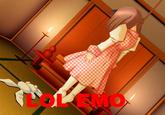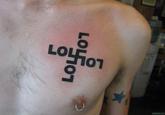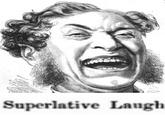LOL
Part of a series on Internet Slang. [View Related Entries]
[View Related Sub-entries]
About
LOL is an abbreviation for "laugh out loud," "laughing out loud" or sometimes "lots of laughs," used in messages to convey laughter. Since its first use online in the 1980s as a slang term, LOL has become one of the most popular abbreviations on the web and is common knowledge among most internet users.
Origin
Pre-Internet
The abbreviation "LOL" predates the internet and goes back to letter-writing, where it meant "lots of luck" or "lots of love."[1] LOL carries its own meaning in some foreign languages. In Welsh, "lol" means "nonsense." For example, if a person wanted to say "utter nonsense" in Welsh, they would say "rwtsh lol."

Earliest Online Use
In an article hosted on ucalgary.ca[2] titled "The origin of LOL," posted on an unknown date prior to 2008, a Canadian man named Wayne Pearson claims he's the inventor of LOL as an abbreviation for "laugh out loud," writing:
LOL was first coined on a BBS called Viewline in Calgary, Alberta, Canada, in the early-to-mid-80s. A friend of mine who went by Sprout (and I believe he still does) had said something so funny in the teleconference room that I found myself truly laughing out loud, echoing off the walls of my kitchen. That's when "LOL" was first used.
Crediting himself and one of his friends on a Canadian BBS chatroom called Viewline as the ones who spread its usage as slang through chatrooms and Telnet-based channels, he adds:
The use of the phrase LOL spread quickly around Viewline, but it wasn't until a bunch of us got free GEnie accounts that it really became popular.
GEnie, back then, was one of the big online services at the time, similar to Compuserve and Prodigy. It had hundreds of chatrooms, including trivia rooms (run by script bots -- quite fancy at the time!) A bunch of us Viewliners found these rooms and, of course, our jargon mixed with the regulars of GEnie. (One thing that I took from there, and still use today, is "my" smiley -- *:^) )
At the end of the article, Pearson says there is no backup copy of the initial chat log in order to provide proof of his claim, leaving it as unconfirmed:
If I had any idea that such a thing would spread, I would have saved the original conversation that led to the acronym's inception. Alas, I don't even recall what was so funny! While I can picture in my mind where I was when it happened, I can't narrow the time down any further.
I don't expect you to believe this, really, as so many others don't. Still, it ought to be written out so there's at least a record of it somewhere on the Internet.
On May 8th, 1989, the earliest confirmed usage of LOL as an abbreviation of "laugh out loud" appeared on Page 10 of a FidoNews Newsletter,[3] in a section defining various online acronyms and slang terms (shown below).
![earliest known use of LOL (1989) :) - smile/happy :D - big smile or laugh - mischievious smile ;) - wink :* - frown/sad - pout :'( :( :C :> cry ;> - sly wink - kiss :0 - shout/yawn ]:> - devil/guilty :# - grimace/frustrated :P - sticking out tongue - tastes good :9 B) - glasses c% - coffee cup - shot glass - hug 0:) - angel/innocent - content disfavor/baffled not talking [] :I :/ :X - wide-eyed surprise [% :d 8) - mug - glass wine/cocktail glass U u Y ---<--<-@ long-stemmed rose drink sliding down bar Also worth considering are the following: - On Line Message - Oh I See - By The Way ROTF - Rolling On The Floor LMTO - Laughing My Tush Off - Away From Keys - Back At Keys BCNU - Be Seing You On De Move LTNT - Long Time No Type On The Way - HUH??? Laughing Out Loud Rolling All Over Be Right Back OLM OTW OIC H BTW LOL RAO BRB AFK BBL - Be Back Later ВАK WLCM - Welcome L8R - Later ODM отв - off Tо Bed TTFN - Ta Ta For Now RE - Again (Greetings, as in "re-hi") LTNS - Long Time No See M/F "Oh no! I've been morfed!!") - Male or Female (also known as 'MORFING', as in](https://i.kym-cdn.com/photos/images/newsfeed/002/054/288/f68.png)
Spread
LOL spread across the web naturally over the course of three decades through word-of-mouth and continued use.
It's unclear if the birth of other types of laughing acronyms, like ROFL or LMAO, were directly the result of LOL's increasing popularity on Usenets and other kinds of BBS.
On March 25th, 2011, the Oxford English Dictionary added the acronym to the dictionary along with OMG and FYI.[5]
Translations
As the usage of the acronym has increased, it has spread across the world with various translations of it documented on Wikipedia[4] and in the graph below. Most of these variants are typed in lowercase.

Usage as a Verb
In a manner similar to Fap slang, "LOL" has been transformed into a verb, with its own set of temporal conjugations: Lol as an infinitive, LOLed (often reduced to lol'd) for preterite and past participle, and Lolling as a present participle (examples of use as a verb below).


In addition to its neologic verb form, several other modified versions of LOL, used in similar ways, have become popular, including "lolz," "lulz" (used to indicate confusion and laughter at once), "lawl" and kek (a World of Warcraft translation of LOL that became popular on 4chan).

Impact On Meme Culture
A number of memes use the acronym "lol" in some aspect of their format as it is easy to work into a phrase to change its initial meaning, and denotes comedy. A selection of memes that directly include LOL in their title or are popular due to the acronym include:
- LOL ASCII (2003)
- LOL JESUS
- LOL, Internet (2005)
- LOLcats (2006)
- LOL WUT (2006)
- LOLrus (2007)
- LOLgraphs (2008)
- Trololo Guy (2009)
- LOL Guy (2010)
Decrease and Change In Usage
In 2016, Facebook conducted a study on whether people preferred using "lol," "haha," "hehe" or an emoji to convey laughter in their messages. The data, published by Trak.in[6] on December 5th, 2016, showed "haha" to be the most popular, "emoji" second, whereas "lol" was the least used, evidencing a decrease in its popularity with the rise of emojis (graph shown below).

On April 5th, 2019, Nicole Gallucci published an article to Mashable[7] about her tendency to type "lol" in messages involuntarily when nothing is evidently funny and exploring why people tend to do this, coining the phenomenon as being on "auto-lol" and evidencing the acronym's shifted and more casual intentions since the '80s.
Various Examples






Search Interest
External References
[1] Wikipedia – LOL article
[3] FidoNews – International FidoNet Association Newsletter / 5-8-1989
[4] Wikipedia – LOL – Translations in widespread use
[5] CNN – OMG! Oxford English Dictionary adds new words
[6] Trakin – The Verdict Is Out: ‘Haha’ Is More Popular Than ‘Lol’ When It Comes To Online Laughing
[7] Mashable – Why so many people type 'lol' with a straight face: An investigation
Recent Videos 7 total
Recent Images 112 total
Share Pin



![earliest known use of LOL (1989) :) - smile/happy :D - big smile or laugh - mischievious smile ;) - wink :* - frown/sad - pout :'( :( :C :> cry ;> - sly wink - kiss :0 - shout/yawn ]:> - devil/guilty :# - grimace/frustrated :P - sticking out tongue - tastes good :9 B) - glasses c% - coffee cup - shot glass - hug 0:) - angel/innocent - content disfavor/baffled not talking [] :I :/ :X - wide-eyed surprise [% :d 8) - mug - glass wine/cocktail glass U u Y ---<--<-@ long-stemmed rose drink sliding down bar Also worth considering are the following: - On Line Message - Oh I See - By The Way ROTF - Rolling On The Floor LMTO - Laughing My Tush Off - Away From Keys - Back At Keys BCNU - Be Seing You On De Move LTNT - Long Time No Type On The Way - HUH??? Laughing Out Loud Rolling All Over Be Right Back OLM OTW OIC H BTW LOL RAO BRB AFK BBL - Be Back Later ВАK WLCM - Welcome L8R - Later ODM отв - off Tо Bed TTFN - Ta Ta For Now RE - Again (Greetings, as in "re-hi") LTNS - Long Time No See M/F "Oh no! I've been morfed!!") - Male or Female (also known as 'MORFING', as in](https://i.kym-cdn.com/photos/images/list/002/054/288/f68.png)















